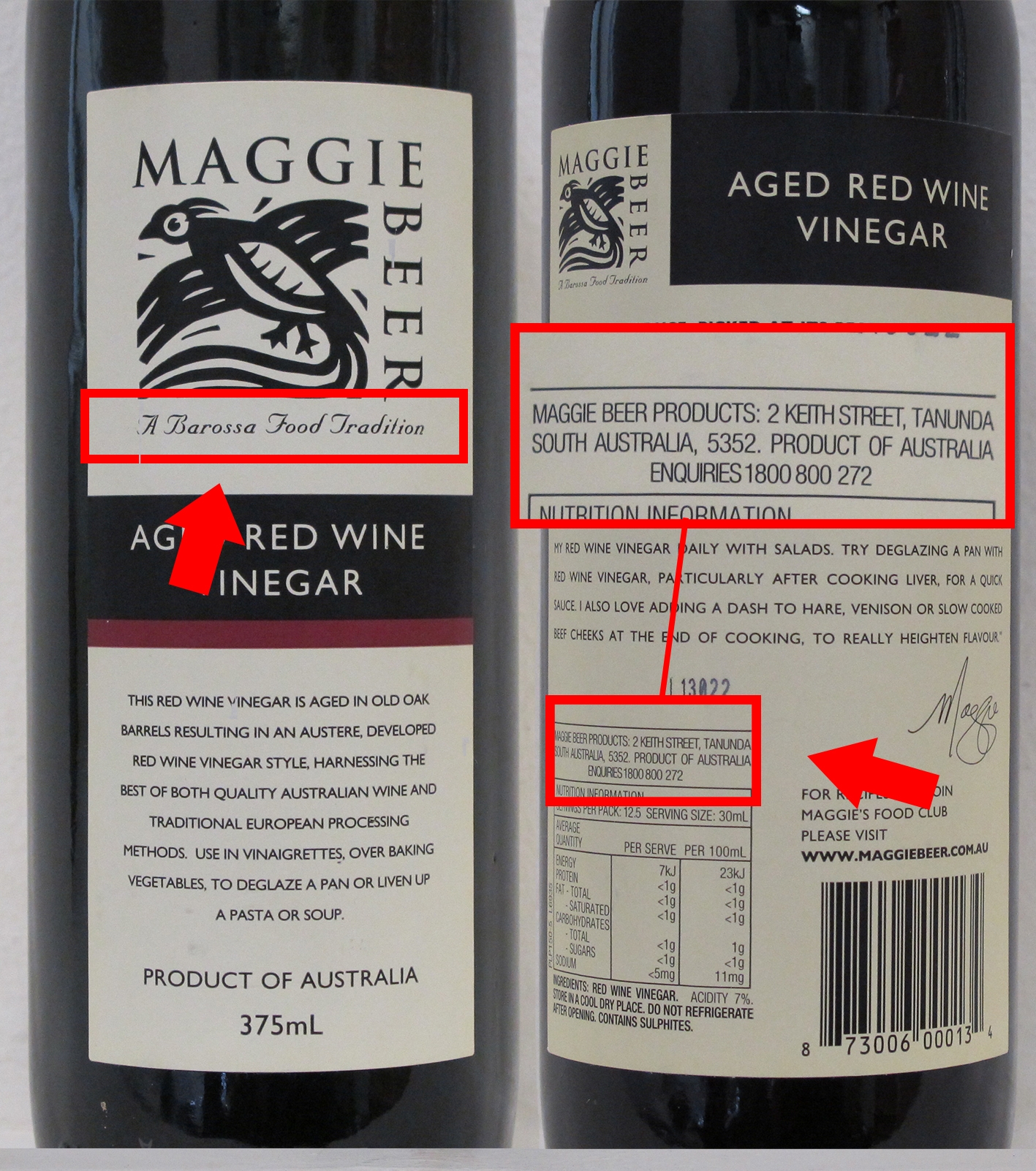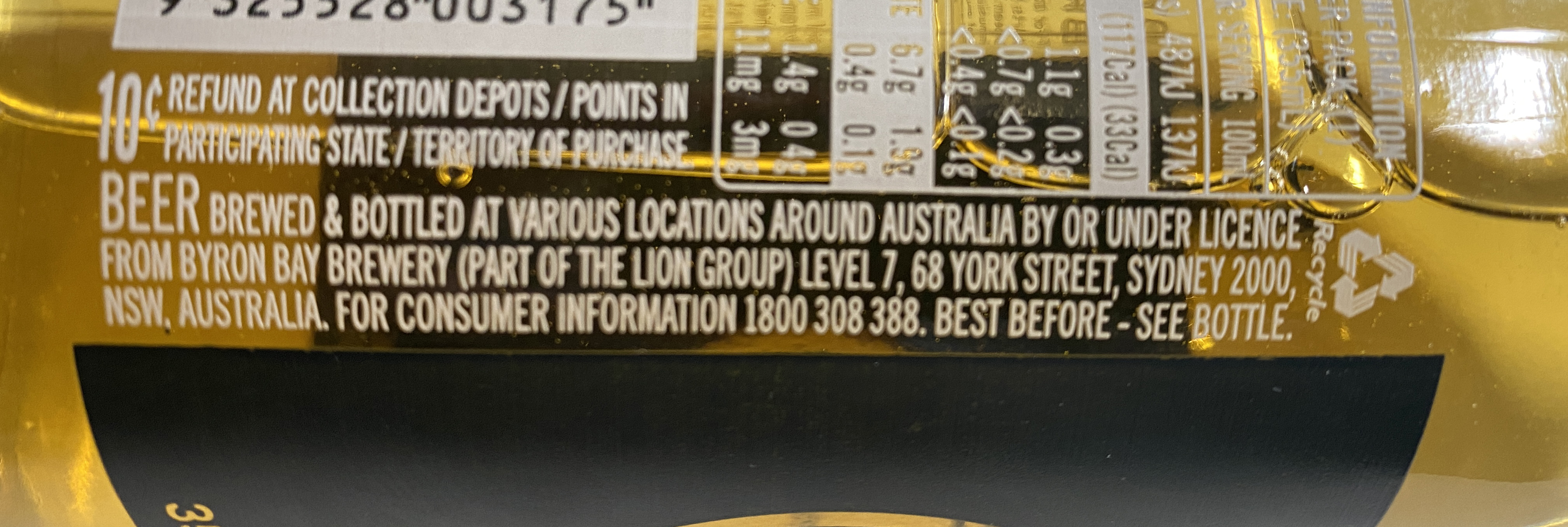
Local love reignites labelling issue
Beer brands hoping to benefit from drinkers’ love for local have reignited the thorny issue of provenance and beer labelling.
The issue last flared in 2014 when CUB was fined by the ACCC for its misleading labelling of Byron Bay Pale Lager. Debate has been reignited as smaller, independent brands adopt local names for beers brewed under contract elsewhere, without disclosing the arrangements on their labels.
In the 2013 Byron Bay Pale Lager case, CUB licensed the Byron Bay Pale Lager brand from its then owner and brewed the beer at its Warnervale brewery. The beer’s labelling incorporated the Byron Bay name, a representation of a lighthouse, text regarding Byron Bay and the Byron Bay Brewery, and a map of the Byron Bay region showing the location of the brewery’s location.
The bottle labels included the brewery’s Byron Bay address and then “Brewed in NSW by the Byron Bay Brewing Company and its Licensees”.
The ACCC took the action saying it was “concerned that the overall representation made by the Product [sic] labelling is likely to mislead consumers to understand that the beer contained in the bottle has been brewed by BBBC.”
CUB was fined $20,400 for the conduct.
ACCC engages with contract brewers
In the wake of the decision, the ACCC advised it would be writing to other brewers to ensure that their beer marketing and labelling appropriately reflects “where and by whom” it was brewed.
The following year, ACCC chair Rod Sims told Radio Brews News that a dozen brewers had agreed to change their beer labels to ensure they didn’t mislead consumers in the wake of the ACCC action.
“We’ve had an interest in what are called ‘credence claims’,” Mr Sims told the podcast in 2015.
“Sometimes people will say a good is made in Australia when it’s not or it’s made in King Island when it’s not,” he explained.
“So giving it some appeal that it doesn’t have because it’s not Australian made, or it’s not a cheese product or a meat product from King Island, which has a premium brand rating,” he said.
You can listen to the interview with Rod Sims below, or download a full transcript.
Sims said the watchdog looked at these things for two reasons.
“One is consumers are paying for something that they’re not getting, and two is that people who are competing legitimately are losing out.”
Sims said the ACCC had written to a large number of brewers at the time, “to make sure they understood what had happened and what it meant for them”.
“Fundamentally we’ve been trying to get two things, one is to get them to say when it’s in fact a big company that’s making the product,” he said.
“Also we’re making sure that when you’ve got a small company, if they start to brew the beer under contract, that they make that clear on the back of the label.”
Why it matters now
Brews News has spoken to a wide range of brewers** in recent months with concerns about the issue and understands that it has been a topic of debate across the industry. At the same time, many craft brewers asked not to be quoted on the record to avoid calling out any particular competitor.
But one brewer, picking up on Rod Sims’ concern that people who are competing legitimately risk losing out, explained to Brews News the challenge they faced in expanding their brewery.
“The town planning application cost us more than $30,000 that we’d been told wasn’t needed. That money, not to mention the cost of the brewery itself, could have gone towards a kitchen which would have improved our offer,” they said.
They also noted that a beer cafe could open up the road from their location-based brewery with contract-brewed beer and a kitchen and consumers would be none-the-wiser with current labelling practices.
Another told Brews News that although they were concerned the practice was a way to flood the market with inauthentic brands that would hurt the industry, they didn’t see the point in raising it.
“I don’t think it’s a fight I can win, I think it’s something that’s just part of the scene,” they said.
“I’ve accepted now that it’s the industry, I don’t know if many people are even having the conversation.”
The brewer, who also noted the costs they bore establishing a brewery, added that it would be a good start to have a production address on the label.
“The legalities are they need to have an address on the can, but not where its made which seems weird.”
“By calling it out, people might start to take notice the truth on the can, and people might start to buy that way, and help the little guys out.”
Provenance matters, sometimes
Since the ACCC’s 2015 investigation, the brewing industry has been flooded with new entrants with many choosing to launch their brand with a contract partner.
An increasing number have chosen to target an ultra-local feel or create a marketable brand by playing to positive consumer feelings about an area through the business name, despite contract brewing elsewhere.
Think of an iconic Australian location there’s a chance that it has a beer named after it, or soon will have, with a social media account that celebrates the wonders of the namesake location.
An increasing theme is that many will also prominently sport the Independence seal adopted by members of the IBA to ensure that there is no mistake as to ownership on the packaging.
The insight that consumers may be interested in provenance rarely extends to explaining that the beer may not be brewed in the iconic location.
Despite the ACCC saying it requires clear labelling on the packaging if a brand is made under the contract, many brands appear unaware of the advice.
The owner of one geographically-named contract brand** that includes a business address on its packaging without noting the beer was made offsite or under contract said they “did what they had to”.
“I looked at the IBA guidelines and included an address, Drinkwise and the pregnancy logo, which is what I was meant to do and what [their contract brewer*] told us was required.”
“I didn’t think anyone cared [where it’s made] and if they did, they would Google it,” they said. “We tell the stockists and we’ve told anyone who’s asked.”
However, their website contains an ebullient sales pitch referred to the beer being “created” in the brand’s eponymous location, with the address details on the site noting “Made in Australia by [Geographic Business] — [business address, geographic name] Australia”.
The site doesn’t mention the beer was made in partnership with another brewery or that it was made at a different site that its named location.
In an apparent recognition that consumers do care about some aspects of provenance, the business address was located next to the independent brewers’ seal.
What is required?
While large brewers have governance teams to assist with regulatory compliance, the Independent Brewers Association maintains a comprehensive guide to the various labelling requirements, although it doesn’t monitor member compliance with the guidelines.
“The IBA guidelines are a ‘one-stop-shop’ for its members to ensure that it is easy to comply with the plethora of requirements in regard to labelling,” IBA general manager Kylie Lethbridge said.
“Other than use of the Independent Seal we do not ‘police’ any other policy but encourage the member to follow those set out by relevant industry regulators, and in this case ACCC guidance on this matter appears to be clear,” she said.
The IBA guidelines do not suggest a form of words for beers made under contract, instead highlighting the separate requirements of the Australia New Zealand Food Standards Code and the ACCC.
While the Food Standards Code says that a ‘supplier address’ is required, which can include either the brewer, contract brewer, vendor or importer, the overlapping ACCC requirements may go further.
An ACCC spokesperson told Brews News that under the Australian Consumer Law, businesses cannot make false, misleading or deceptive claims about their products.
“Any claim a business makes about a product needs to be true, accurate, and able to be substantiated,” the statement said.
The watchdog cautioned that whether the labelling of any products may be misleading under the Australian Consumer Law depends on the overall impression conveyed to a reasonable consumer by the packaging as a whole.
“Any such consideration takes into account matters such as specific statements made, and images used and their relative prominence, placement and size.”
“Businesses that use contract breweries need to ensure their marketing and labelling clearly and appropriately reflects where and by whom the beer is brewed,” the spokesperson said.
What is ‘making it clear’?
While some brands make no apparent effort to ensure clarity about the contracting arrangements behind their brand, using words such as “Brewed By”, others use a form of words such as ‘made for’ and ‘brewed for’ in conjunction with their business address believing consumers will understand the implication in this use of the words.
Aside from the 2014 Byron Bay case, in which CUB was fined despite noting on its packaging that the beer was “Brewed in NSW by the Byron Bay Brewing Company and its Licensees”, the ACCC looked into claims made by Maggie Beer Products and found them likely to be misleading.
In that case the “Maggie Beer” logo which included the words “Maggie Beer A Barossa Food Tradition” on the label. The label also contained the words “Made in Australia” or “Product of Australia” and the business address, “Maggie Beer Products: 2 Keith Street Tanunda South Australia 5352”.
In finding that the labelling was misleading, the ACCC felt that the overall impression created was that the products were made in Tanunda.
“The ACCC considered that as a result of these representations in close proximity on the labels, a reasonable consumer would have gained the overall impression that each of these products was manufactured in Tanunda, the Barossa Valley and/or South Australia, when in fact this was not the case,” it announced.
“Consumers are often willing to pay premium prices for local products and businesses are following consumer demand by stocking local goods. Protecting the integrity of credence claims made about food products is a priority enforcement area for the ACCC,” ACCC chairman Rod Sims said in the statement.
“The Barossa Valley is a nationally-recognised premium food and wine destination, and businesses in that region use place of origin claims to promote or distinguish their product from others in the market.”
“Misleading representations about the origin of products to capitalise on this demand undermines the integrity of credence claims which are relied on by consumers and, equally important, can harm competing producers whose products are made locally.”
Lessons learned
Byron Bay Brewing was acquired by Lion in 2016 and Lion was not involved in the 2014 labelling case. In 2019 Lion launched Byron Bay Premium Lager nationally. The label includes the statements:
“Beer brewed & bottled at various locations around Australia by or under licence from Byron Bay Brewery (Part of the Lion Group) Level 7, 60 York Street Sydney, 2000, NSW”
And separately in capitals under an information panel about the history of the Byron Bay Brewery,
“Born in Byron Bay, for bottling the beer is brewed outside of Byron Bay.”
**No names have been used in this article as the intent is not to call out individual breweries but to raise an issue that has raised with us with increasing frequency by concerned brewers.





